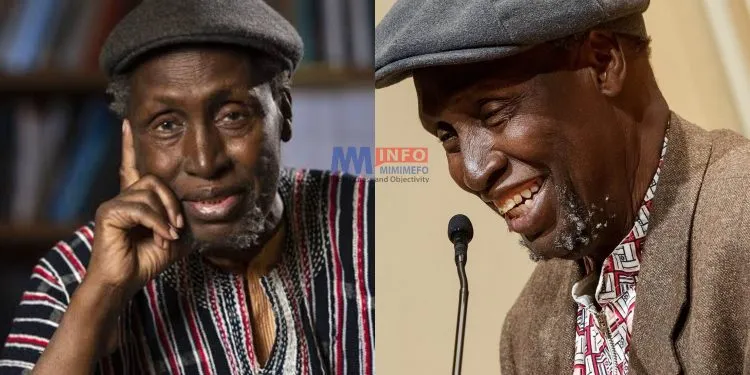Renowned writer and scholar Ngũgĩ wa Thiong’o, a leading figure in African literature and postcolonial thought, has died at the age of 87, according to a family announcement posted on Wednesday.
“It is with a heavy heart that we announce the passing of our dad, Ngugi wa Thiong’o,” his daughter Wanjiku Wa Ngugi wrote on Facebook.
“He lived a full life, fought a good fight,” she added.
The immediate cause of death has not yet been confirmed, though reports indicate that he had been receiving kidney dialysis treatments at the time of his passing.
Early Life and Education: Shaped by Struggle
Ngũgĩ wa Thiong’o was born in 1938 in Kamiriithu, near Limuru in British-ruled Kenya. His early years were shaped by the Mau Mau uprising of the 1950s, a violent anti-colonial movement that profoundly influenced his worldview and later literary themes.
Initially writing under the name James Ngugi, he studied at Makerere University in Uganda and later at the University of Leeds in the UK. He published his debut novel, Weep Not, Child (1964), as the first English-language novel by an East African writer, marking the start of a prolific literary career.
Literary Works: Chronicling Colonialism and Its Aftermath
Ngũgĩ’s novels, plays, and essays critically examined British colonialism and the socio-political realities of post-independence Kenya. Works like The River Between (1965), A Grain of Wheat (1967), and Petals of Blood (1977) delved into themes of identity, land, class, and national betrayal.
In 1977, the Kenyan government banned his politically charged play Ngaahika Ndeenda (I Will Marry When I Want), which he co-wrote with Ngũgĩ wa Mirii. That year, authorities arrested him and held him without trial in a maximum-security prison.
While incarcerated, Ngũgĩ wrote Devil on the Cross (1980) in Gikuyu on prison-issued toilet paper—an act of defiance and cultural assertion.
Language and Resistance: From English to Gikuyu
In a pivotal career move, Ngũgĩ renounced English as a literary language and embraced indigenous African languages, especially Gikuyu.
“We all thought he was mad… and brave at the same time,” fellow Kenyan writer David Maillu told AFP.
“We asked ourselves who would buy the books.”
Ngũgĩ’s decision was both literary and political. His 1986 essay collection, Decolonising the Mind, outlines his philosophy that true cultural liberation can only occur through the use of native languages.
“It is impossible to liberate oneself while using the language of oppressors,” Ngũgĩ argued in the book.
Exile and Academic Career in the United States
Following a government crackdown on intellectuals and artists, Ngũgĩ went into self-imposed exile in 1982. He first moved to the UK before settling in the United States. He joined the University of California, Irvine, where he served as Distinguished Professor of English and Comparative Literature.
Despite being abroad, Ngũgĩ remained deeply engaged with Kenyan and African issues through his writing. His later works include Matigari (1986), Wizard of the Crow (2006), and The Perfect Nine (2020), the latter longlisted for the 2021 International Booker Prize.
A Life of Recognition and Controversy
Ngũgĩ’s body of work earned him numerous international accolades and frequent speculation as a candidate for the Nobel Prize in Literature. His writings were translated into dozens of languages, and his short story The Upright Revolution has been published in over 100 languages.
In 2004, Ngũgĩ and his wife Njeeri wa Ngũgĩ faced an attack in their Nairobi apartment during a visit to Kenya, an incident widely viewed as politically motivated. Despite this, he continued to visit and speak on Kenyan affairs throughout his later years.
Tributes from Across the Globe
Following news of his death, tributes poured in from political leaders, academics, and readers.
“My condolences to the family and friends of Professor Ngugi wa Thiong’o, a renowned literary giant and scholar, a son of the soil and great patriot whose footprints are indelible,” wrote Kenyan opposition leader Martha Karua on X (formerly Twitter).
“Thank you Mwalimu [teacher] for your freedom writing,” Amnesty International Kenya posted.
Margaretta wa Gacheru, a sociologist and former student, offered a comparison with a literary titan:
“To me, he’s like a Kenyan Tolstoy, in the sense of being a storyteller, in the sense of his love of the language and panoramic view of society, his description of the landscape of social relations, of class and class struggles,” she said.
Legacy: From Mortality to Immortality
Ngũgĩ wa Thiong’o’s legacy lies not only in his books but in his unwavering commitment to linguistic justice, cultural authenticity, and political truth. His works are studied in universities worldwide and continue to inspire generations of writers and thinkers.
“Having already earned his place in Kenyan history,” Amnesty International noted, “he transitions from mortality to immortality.”



